This has been a fun week sending out bunches of pre-orders — almost all that we mentioned as forthcoming in that BookNotes a few weeks ago have now come into our Dallastown store. From the raw, brave poetry of Katy Bowser Hutson (Now I Lay Me Down To Fight) to the 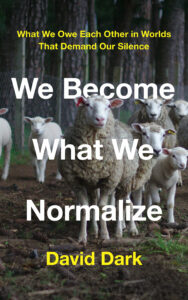 extraordinarily beautiful leather-bound prayer book, Every Moment Holy III to the fascinating new Mark Noll study of the early reception of C.S. Lewis, C.S. Lewis in America, we are eagerly sending special orders out. A few of you asked us to hold your orders until the release of Eugene Peterson’s sermons for the church year (Lights a Lovely Mile) which just arrived and David Dark’s creative and compelling We Become What We Normalize and that is scheduled to arrive quite early, any day now.
extraordinarily beautiful leather-bound prayer book, Every Moment Holy III to the fascinating new Mark Noll study of the early reception of C.S. Lewis, C.S. Lewis in America, we are eagerly sending special orders out. A few of you asked us to hold your orders until the release of Eugene Peterson’s sermons for the church year (Lights a Lovely Mile) which just arrived and David Dark’s creative and compelling We Become What We Normalize and that is scheduled to arrive quite early, any day now.
In this BookNotes we want to alert you to a book which just arrived and about which I’m thrilled. Agree or not with all of David Brooks views as he does his PBS punditry, he is a fascinating gentleman. We’ll describe his brand new How To Know a Person: The Art of Seeing Others Deeply and Being Deeply Seen and then I’ve put together a small handful of a dozen other similarly thoughtful, (mostly) recently published, culturally-savvy titles that I might call “smart self help books.” This is a delightful column to do, but also urgent, very urgent. With an epidemic of loneliness and too much despair among all sorts of people — ages, classes, races, religions, demographics — we need all the help we can get. I hope you know how important these books about personal growth and health can be and that you don’t scorn (as some serious literary types do and as some gospel-centered zealots do) this genre of sensible, useful books helping us live well.
As always, thank you for your support of our family business. Most of us have seen our share of sorrows and even comedians are now doing riffs about how hard daily life can be, so we hope this short BookNotes list gets shared widely. We believe bookselling is a ministry, and we earnestly hope this helps serve you as we we strive to be holy and human and known.
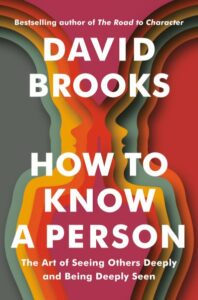 How To Know a Person: The Art of Seeing Others Deeply and Being Deeply Seen David Brooks (Random House) $30.00 OUR SALE PRICE = $24.00
How To Know a Person: The Art of Seeing Others Deeply and Being Deeply Seen David Brooks (Random House) $30.00 OUR SALE PRICE = $24.00
We first discovered Brooks with his book done in the early days of the new millennium that I just adored — if you knew us then, I probably tried to press it into your hands: Bobos in Paradise: The New Upper Class and How They Got There. What a fun and frankly breathtaking array of insights around a somewhat snarky critique of bobos. For those who aren’t familiar with it, you really should order it from us; here is how the publisher says sets it up:
Once it was easy to distinguish the staid Bourgeois from the radical Bohemians. This field study of America’s latest elite — a hybrid Brooks calls the Bobos — covers everything from cultural artifacts to Bobo attitudes towards sex, morality, work, and leisure.
Brooks went on to do another fascinating study on somewhat similar territory about home landscaping and lawns and the worldviews of forward thinking young Americans, again, a book I so enjoyed and really loved, entitled On Paradise Drive: How We Live Now (and Always Have) in the Future Tense.
The Social Animal: The Hidden Sources of Love, Character, and Achievement came out a few years later and took “obscure but potent social science research” and made it what the New York Times Book Review called “startling.” Listen to this quote about it from The Philadelphia Inquirer about the genius (and big vision) of the creatively written The Social Animal: “Provocative and fascinating… seeks to do nothing less than revolutionize our notions about how we function and conduct our lives.”
While known as a moderately conservative thinker (having moved more centrist over the years, I think) with a congenial presence on many talk shows and in The New York Times, as a writer (fabulously popularizing interesting social science research) Brooks became an even bigger bestseller with The Road To Character which, for those with the eyes to see, indicated a journey the serious thinker was on: what does it mean to be good? Can we serve others, care about our civic and public lives, and be happy? What sort of virtues are needed for such decent work? He was writing about the likes of Dorothy Day and other social reformers, and admitted in the acknowledgements that he was in conversations with some evangelical scholars and his pastor friend, the late Tim Keller. Rumors in our circles were that he was becoming a Christian. He married a very, very sharp young thinker, a journalist from Wheaton College. The Road to Character became well known across the spectrum of mainstream readers but evangelical Christians were among his most alert followers. I liked that book a whole lot, serious and readable as it was. The Guardian sad it was powerful, a “haunting books that works its way beneath your skin.”
When he did his major release about mid-life and the third season of life, asking what comes next for the successful professional who achieved worldly success and was still seeking — cue U2’s “I Still Haven’t Found What I’m Looking For” and catch the Christian themes in that great quest song — and realize that perhaps Mr. Brooks had, indeed, found something lasting and something eternal. It seemed as if he was identifying himself as a practicing Christian. That aside, even for the most secular reader, The Second Mountain: The Quest for the Moral Life was a lifeline. The Washington Post called it “Deeply moving, frequently eloquent, and extraordinarily incisive.” He was, I’d say, a public intellectual, respected if not always understood. Perhaps a bit of a bobo himself, a social animal on a road to character and on a second mountain (okay, somebody stop me!) he now tells, in the start of this new work, that he was raised with a slogan “Think Yiddish, act British.” Raised in a well-educated, thoughtful, verbose family, he was taught well. He says “there was love in our home, we just didn’t express it.”
One needn’t be aware of the arcane details of elite institutions of higher education to get the gist of his education and culture when he admits that his alma mater (the University of Chicago) was, as the saying goes, “A Baptist school where atheist professors teach Jewish students about Saint Thomas Aquinas.” He says wryly that he fit right in. Ha!
By the next few pages of How to Know a Person you learn about his stodgy intellectual neediness and his emotionally repressed self reserve. He talks about the joy of being on a panel discussion about the arts in public life with some theatre people, a singer, a famous actress. Unlike DC confabs that he was used to there was comradely and joy, joint purpose and congenial caring. He didn’t quite know how to emote, but he tried. It was fantastic. He resolved to explore this more, and he quips, “Yes, I”m the guy who had his life changed by a panel discussion.”
Funny? Yes. Serous — given the horrors of mounting rates of suicide and the nearly routine accounts of chronic loneliness — yes, again, yes. How to Know a Person is about the art of relationships, of being seen, and of seeing others. It is a bit surprising for most think-tank, political pundits, but fans will not be surprised. We’ve seen it coming.
I, for one, am delighted and glad. He is still pushing us to think well about civic life and challenges my own left of center politics a lot. I admire him, his graciousness and wit, and how sensible he often is, reminding those on the right to care for the poor, say, and those on the left that a major legislative victory about a social service safety net still isn’t enough — we need to care for our neighbors and be involved in the lives of others.
He doesn’t say anything about it, but I think an important bit of information that may be important to some of our BookNotes readers is that the wife of David Brooks, the impressive Ann Snyder, is the editor of Comment magazine, a rigorous, artful, deep journal of public opinion, standing somewhat in the older heritage of Abraham Kuyper and reformational worldview perspectives. Brooks cites a piece in the new book from Comment written by black memoirist Dante Stewart where he explains how notions of memory and history were important for black folks inspired by writers like Zora Neal Hurston and Langston Hughes — it is a good section. That Anne and David share a love for literature and the arts is vital as they see that our faithful presence as God’s agents in the world must include the sort of ineffable (and often sublime) awareness that comes as we attend to the aesthetic dimensions of our social lives together.
(One of my favorite books in recent years is the nearly 500 page anthology Breaking Ground: Charting Our Future in a Pandemic Year co-edited by Anne Snyder, published by Plough [regularly $35.00 / OUR SALE PRICE = $28.00.] That Snyder guided and contributed to that project of conversation and meaningful social discourse with writers as diverse as Marilyn Robinson, Tara Isabella Burton, Jeffrey Bilbro, N.T. Wright, to the aforementioned Dante Stewart and dozens more is an indication of her strong, ecumenical gifts; surely that hospitable practice of good conversations has shaped David’s own sense of the nature and possibilities of a healthy life in these times. I’d like to be the first to suggest that there is a connection between that book and this new one, both emerging from the Brooks/Snyder household.)
To cut to the chase, Mr. Brooks observes that “there is one skill that lies at the heart of any health person, family, school, community organization or society: the ability to see someone else deeply and make them feel seen — to accurately know another person, to let them feel valued, heard, and understood.”
As the publisher notes, “The act of seeing another person,” Brooks argues, “is profoundly creative: How can we look somebody in the eye and see something large in them, and in turn, see something larger in ourselves? How to Know a Person is for anyone searching for connection, and yearning to be understood.”
“The act of seeing another person,” Brooks argues, “is profoundly creative: How can we look somebody in the eye and see something large in them, and in turn, see something larger in ourselves? How to Know a Person is for anyone searching for connection, and yearning to be understood.”
Oh my. How does this happen? What a generous and curious question! Brooks’s “trademark curiosity” pushes him to research the fields of neuroscience and psychology — not to mention theatre, philosophy, history, and education. He has his own personal desire to grow and change, so the book seems well researched, finely crafted, and deeply heartfelt.
In his acknowledgments he notes a crew of friends, writers and editors and pundits. He mentions two good guys who were close to him who he now misses: Mike Gerson and Tim Keller. He doesn’t cite either in the book, I don’t think, but, as with his wife Anne’s connections to Comment, if these authors and Christian leaders were in his own circle as he was writing this, it seems to add an exceptional degree of poignancy and even heft. I’ve got a dozen books waiting on my most urgent stack. I’m bumping this one up and starting it asap. Won’t you join me?
TEN MORE (MOSTLY) NEW BOOKS ABOUT RELATIONSHIPS, PERSONAL GROWTH, SMART GUIDES TO SELF IMPROVEMENT (and a gorgeous one about civility.)
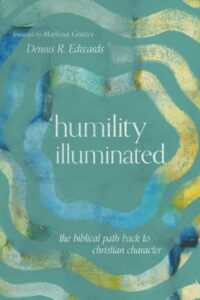 Humility Illuminated: The Biblical Path Back to Christian Character Dennis Edwards (IVP) $22.00 OUR SALE PRICE = $17.60
Humility Illuminated: The Biblical Path Back to Christian Character Dennis Edwards (IVP) $22.00 OUR SALE PRICE = $17.60
I have read other books of Edwards — now an academic leader and dean at North Park Seminary near Chicago — and I respect him immensely. He’s done Bible commentaries (I Peter in the Story of God Bible Commentary series) and, most recently, a splendid book that we highlighted just a few years ago at BookNotes, Might from the Margins: The Gospel’s Power to Turn the Tables on Injustice published by the good folks at Herald Press. To read about such empowering social transformation based so clearly on the upside-down Biblical teachings of God’s Kingdom was thrilling and I’ve been awaiting anything new from this wise brother.
There have been a few other important books on humility in recent years (think of the extraordinary 2022 one by Richard Foster, Learning Humility) but I have a hunch this brand new one is going to become a classic. It explores this paradoxical power, especially in the New Testament, showing how it is a distinctive mark of the Christian.
This seems to be a book for us all, but certainly for serious-minded followers of Christ who want the church to be a community of those following the revolutionary path of Christ.
In a way, this might be an important, even urgent book to read in tandem with the one by David Brooks — Edwards offers a more explicitly Biblical and theological study and my hunch is it would be a good pairing.
Dennis Edwards eloquently writes that the (all-but-extinct) virtue of humility ‘brings truth’s light by throwing back the shutters of arrogance and opening the window of curiosity.’ Similarly, this wonderful book–by someone who embodies its subject–offers a window into the multifaceted Christian identity marker of humility before God and others, throwing back the shutters of distortion and misunderstanding. Well-researched, wise, and highly readable, this is a timely book for all Christians in an age of competition, self-promotion, and division. — Michael J. Gorman, Raymond E. Brown Professor of Biblical Studies and Theology at St. Mary’s Seminary & University in Baltimore, author of Cruciformity: Paul’s Narrative Spirituality of the Cross
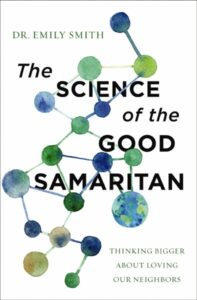 The Science of the Good Samaritan: Thinking Bigger About Loving Our Neighbors Dr. Emily Smith (Zondervan) $19.99 OUR SALE PRICE = $15.99
The Science of the Good Samaritan: Thinking Bigger About Loving Our Neighbors Dr. Emily Smith (Zondervan) $19.99 OUR SALE PRICE = $15.99
Dr. Emily Smith is a professor in the Department of Emergency Medicine / Surgery at Duke University and at the Duke Global Health Institute. She became known as the “friendly neighborhood epidemiologist” through her social media outlets during the worst of the COVID-19 pandemic. It is my sense that we need her now more than ever.
What does it mean to love your neighbor in todays’ fraught, divided world? She takes us to Jesus’s story of the Good Samaritan, which is good, but not surprising. But then she brings her expertise as a scientist and, as she tells of her journey from small-town Texas to a prominent university position, you realize this is a very entertaining and special book. With some lovely teaching and inspiring vignettes, she invites us to a pretty radical vision. We can find shared values with people from different backgrounds, faiths, and cultures. We can reach outside our immediate circles to bring in those on the margin. Can we bridge the gaps that so divide us?
She has lots of lovely chapters, upbeat and energizing, moving from “Centering” to “Cost” to “Courage.” Her appendix of great books that have influenced her is wide-ranging and fascinating. This new book looks really, really nice.
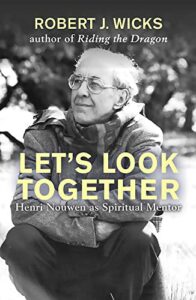 Let’s Look Together: Henri Nouwen as Spiritual Mentor Robert Wicks (Orbis Books) $20.00 OUR SALE PRICE = $16.00
Let’s Look Together: Henri Nouwen as Spiritual Mentor Robert Wicks (Orbis Books) $20.00 OUR SALE PRICE = $16.00
Again, this is a new title for us and we’re thrilled to highlight it, although I’ve yet to study it carefully. I hope you know the prolific Robert Wicks. We heard him speak more than 30 years ago and knew then that he was a saint and a true publishing force. He’s since written many books from his position (now emeritus) at Loyola University in Maryland, where he specialized in pastoral care, psychology, nursing, theology, and education — from Merton to medicine, as somebody quipped once. A Catholic renaissance man with a broad, caring vision, this is a book that, despite the cottage industry of books about Nouwen, is one that has never done. What a great idea it is! Let’s Look Together unpacks for us things from Henri’s extraordinary life and his many books as it relates to how he did spiritual direction, guided others, mentored people. Both in the fairly formal settings of monastic life and in the looser campus ministry world of higher education (and later, as a teacher) Fr. Nouwen cared for others and influenced them deeply. He cared, he walked with, he listened, he guided, through good times and bad.
In the middle section, the heart of the book, Wicks invites us to explore four key themes in Henri’s spirituality and how they were generative and influential for how he leaned into the practice of mentoring others. These four topics are (1) desert wilderness, (2) ordinariness, (3) compassion and community, and (4) vulnerability and prayer.
There is a nice chapter on influential mentorship now, not only how Nouwen did it, but how we can do it today. We, too, are called to inform at least ourselves and perhaps take up the high calling of walking with others through their own spiritual formation as we make disciples. This little book should appeal to anyone who is intrigued by Henri Nouwen and, I’d think, those who read about leadership, disciple-making, mentoring, teaching. Hooray.
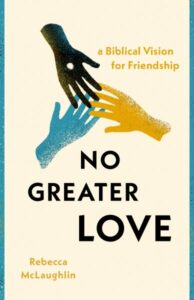 No Greater Love: A Biblical Vision for Friendship Rebecca McLaughlin (Moody Press) $15.99 OUR SALE PRICE = $12.79
No Greater Love: A Biblical Vision for Friendship Rebecca McLaughlin (Moody Press) $15.99 OUR SALE PRICE = $12.79
I do not mean to suggest, by putting this fresh new book on this list, that Rebecca McLaughlin is cut from the same cloth as David Brooks. But she does have a PhD in Renaissance Literature from Cambridge (not to mention a theology degree from the impressive Oak Hill College in London.) She writes for The Gospel Coalition, often following up themes of her important, popular book Confronting Christianity: 12 Hard Questions for the World Largest Religion. Her little book The Secular Creed is one done by TGC which many find succinct and clear. She is known for imaginative and creative apologetics from a conservative Protestant viewpoint and here she surprised some by writing about the tenderness of true friendship.
She notes how good it is to have friends, how supportive and gracious they can be as they comfort us and spur us on. Yet, she says, “friends can also grind us to the ground, exploit us, or invite us to sin.” Okay, then. This happy little paperback may be covering some important, hard ground.
McLaughlin continues about what she hopes to share in this book about what she calls a “love that’s been neglected and malnourished in our modern world” saying:
Slowly, tenderly, with many stumbles along the way, I think I’ve learned to better navigate the contours of this glorious and hazardous gift called friendship.
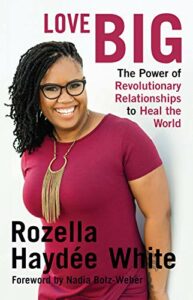 Love Big: The Power of Revolutionary Relationships to Heal the World Rosella Haydee White (Fortress) $21.99 OUR SALE PRICE = $17.59
Love Big: The Power of Revolutionary Relationships to Heal the World Rosella Haydee White (Fortress) $21.99 OUR SALE PRICE = $17.59
This isn’t brand new, but it isn’t that old and I thought of it, again, now. I list it here because it was a thrilling, easy read but also to put it perhaps in conversation with the conservative evangelical vision of McLaughlin, say, and the thoughtful traditionalism of Mr. Brooks. This is less about friendship as such, but more generally about relationships and the power of love. She is a bold storyteller, a leadership coach, a visionary who cares not only about personal friendships but about this generative power that love unleashes, a power to make a difference in the world, hurting and hollow as it often is. One reviewer, journalist and good author Jeff Chu, says her “vulnerable storyteller offers a much-needed reminder of the expansive holistic love of an incarnate God who creates, liberates, sustains.”
There is a lovely blurb on the back (perhaps the last one she ever offered) by Rachel Held Evans who says Roze White “is the mentor you’ve always wanted — kind, wise, insightful, and incisive.” I gather that Rachel knew her well.
The excellent forward is by the always surprising writer and former pastor, Nadia Bolz-Weber who speaks honestly about Roze’s ministry of encouragement to her during an agonizing time of self-doubt. Nadia doesn’t use these words, but I gather she felt known, and per David Brooks, “deeply seen.”
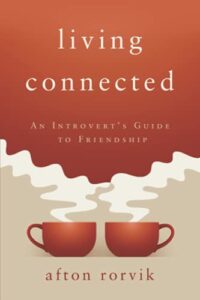 Living Connected: An Introvert’s Guide to Friendship Afton Rorvik (New Hope Publishing) $15.99 OUR SALE PRICE = $12.79
Living Connected: An Introvert’s Guide to Friendship Afton Rorvik (New Hope Publishing) $15.99 OUR SALE PRICE = $12.79
Okay, this isn’t brand new, either, but I just had to list it here. It is a book like no other, and I am sure there are folks out there who are going to love it. Yep, some of us are introverts (or whatever Enneagram or Meyers-Briggs numbers that includes) and well, gee-whiz. A friendship book for introverts! Introverts do so much well, as Jorvik notes. “They listen well, feel deeply, and think carefully. They also take delight in quiet, and they happily spend time alone.” Do you get the tension, here? Listen up: even if you are not an introvert, if you are in relationships with any, you need this book as well.
Introverts, like it or not, need friends, and, yes, God calls introverts to “live connected.” As Rorvik understandably quips, “No small challenge!”
Three cheers for this friend of Hearts & Minds who is a fine writer (she tells us that she “savors words”) and who loves the outdoors. She embraces her introversion as a gift. And has given us a great gift in this book which will be a real gift for many.
Please read these two great recommendations by two trusted friends:
Afton Rorvik gets me. If you’re an introvert, she gets you too. She knows a bit about what it is to live in your skin. In Living Connected, Rorvik leads the reader down a path of discovery and self-understanding. I discovered grace to embrace how and who I am as well as fresh strategies to live well―and to live loved―as an introvert. No one who’s an introvert should miss this book!” ― Margot Starbuck, author of The Grown Woman’s Guide to Online Dating
Living Connected is not just for introverts. It’s for anyone navigating friendship in the twenty-first century. If you are an introvert, Afton Rorvik gets it. She will validate your needs while encouraging you to come to the table with your unique offering. If you’re in relationship with introverts, Living Connected, will help you to better understand what it’s like for them to live in an extroverted culture. Anyone wanting to be a better friend will find encouragement and wisdom in this book. — Dorothy Little Greco, author of Making Marriage Beautiful
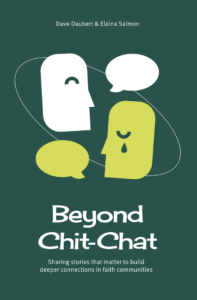 Beyond Chit-Chat: Sharing Stories That Matter to Build Deeper Connections in Faith Communities Dave Daubert & Elaina Salmon (Day 8 Strategies) $12.00 OUR SALE PRICE = $9.60
Beyond Chit-Chat: Sharing Stories That Matter to Build Deeper Connections in Faith Communities Dave Daubert & Elaina Salmon (Day 8 Strategies) $12.00 OUR SALE PRICE = $9.60
We have mentioned other small books by Dave Daubert — an ecumenically fluent Lutheran church consultant and wise coach and leader — such as several short books about being Lutheran in the modern world, a great book on being an online/in-person “hybrid church” and the practical and energetic The Invitational Christian. He knows a bit about congregational health, personal growth, framing it all with a missional sense of being God’s agents of justice and peace in the world. We are pleased to announce his newest here. What a fun, little book with a down-home, plain-as-day title — Beyond Chit-Chat.
In a way, this is not a self-help /personal book and we hardly should put it in the relationships section — we have a growing good section about talking together, communication skills, listening well, managing conflict, and the like. It is really more a guide to how Sunday morning conversations can be deeper than talk of sports, weather, and the like. He’s a church consultant, recall, and know this is pitched to congregational folks.
As Rev. Dave puts it, “People don’t have the safe space, the tools, or the encouragement to share deeper and tell about the places where God has healed, brought joy, accompanied them in suffering, and all the other things the gospel declares God does all the time in their own lives.”
Beyond Chit-Chat is about learning to at least begin to “crack the veneer of mere niceness.”
It can be read alone but I think it might be good to read it with a friend or a group. Want to find tools to not only share our lives more but to have that spill over into congregational life, even stories to share in worship? This is a simple read, a handy guidebook, an open-hearted, real-world, down to Earth, (and super witty) guide to help you learn to listen well and tell better stories. It helps us with conversations with consequence, as one friend of mine puts it. Hooray.
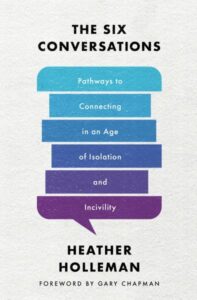 The Six Conversations: Pathways to Connecting in an Age of Isolation and Incivility Heather Holleman (Moody Press) $14.99 OUR SALE PRICE = $11.99
The Six Conversations: Pathways to Connecting in an Age of Isolation and Incivility Heather Holleman (Moody Press) $14.99 OUR SALE PRICE = $11.99
This is a very nice study, a bit more substantive than the great beginners guidebook, above. It offers practical skills for connecting to others (including her “Four Mindsets to a Loving Conversation”) which is one among many best practices she has accumulated and experienced and describes. She has researched well and, yes, practiced it all. (Dr. Holleman is a beloved teaching professor at Penn State University in central PA.)
This one is short and a fairly quick read, and yet invites us to consider really serious stuff like how God has actually made us — she names the social, physical, emotional, cognitive, volitional and spiritual aspects of our humanness —which is a more accurate and rich description than many religiously oriented books. This multi-dimensional orientation is really helpful. Conversation may be harder these days (note the subtitle about isolation and incivility) but she invites us (and teaches us how) to grow in the art of “the six conversations.” Nicely done.
As a communication professor, I am constantly looking for resources and guides to help my students better engage in the process of relationship building. I am so excited about The Six Conversations by Heather Holleman. At a time when people are increasingly divisive, we need more trained communicators who are willing to build bridges. — Heather Thompson Day, author of It’s Not Your Turn: What to Do While You’re Waiting for Your Breakthrough
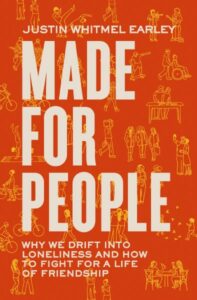 Made for People: Why We Drift into Loneliness and How to Fight for a Life of Friendship Justin Whitmel Earley (Zondervan) $19.99 OUR SALE PRICE = $15.99
Made for People: Why We Drift into Loneliness and How to Fight for a Life of Friendship Justin Whitmel Earley (Zondervan) $19.99 OUR SALE PRICE = $15.99
Here is what I wrote in an earlier BookNotes a few weeks ago. I wanted to share it again:
I hope you know Justin Earley’s amazing previous IVP book called Common Rule: Habits of Purpose in an Age of Distraction. (It was just re-issued in a slightly expanded edition with a new study guide.) It offers nice graphics and charts and nicely colored ink on creatively designed pages to show how there are things in our lives we need to do less of, and things we need to do more of, daily, weekly, monthly. It is one of the very few self-management books that makes sense to those of us with allergies to such stuff, and its design is a gift for those who like grids and charts to make things do-able. He roots his advice in theories of habits and desires and inner transformation, even as he offers right-on, whole-life advice about Christian maturity. The book is a very wise blast of really helpful info and we get orders for it regularly. Yay.
The second one applied much of this same approach and writerly energy (and nice design) to family life, parenting and whatnot. It was called Habits of the Household and, again, is simply stellar, useful, fun. Give it to any young parents you know! It’s really, really good.
This brand new one seems to carry a similar edge and elan, written with energy and honesty (and some multi-colored ink on the cleverly designed pages, complete with line drawings and cartoons.) What fun.
The Made for People book is not cheesy nor simplistic, and the topic is deadly serious. It is, as Kyle Idleman put it, “a clarion call to covenant friendship — a deep abiding love that comes from vulnerability.”
Loneliness has become a cultural epidemic and it literally affects the health and happiness of millions. As it says on the back cover, “busyness, fear of vulnerability, and past pain often stop us from developing the deep friendships we long for. But it’s not supposed to be this way. You were made for people.”
God has made us in God’s own Triune image as people to be in relationship. We, these days, for various reasons, need to relearn key habits that “foster a lifestyle of friendship.” Isolation is not helpful and it need not be the story of our lives. Earley — a busy dad and business lawyer — has a lot to tell and a lot to teach. Just the table of contents is inspiring. I’m going to check it out. Maybe you should start a group to read it together, folks who might deepen in Biblical wisdom for deeper relationships.
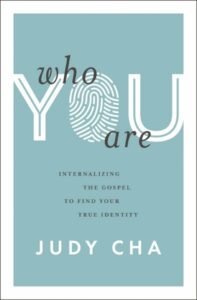 Who You Are: Internalizing the Gospel to Find Your True Identity Judy Cha (Zondervan Reflective) $22.99 OUR SALE PRICE = $18.39
Who You Are: Internalizing the Gospel to Find Your True Identity Judy Cha (Zondervan Reflective) $22.99 OUR SALE PRICE = $18.39
I almost didn’t list this here because I wanted to a longer more substantive review and because it seems at first blush to be a major contribution to Christian psychology. Dr. Cha (who has am MA from Westminister Theological Seminary and a PhD from Eastern University) is a licensed marriage and family therapist specializing in relationship counseling. Much of her work focuses on what we used to call “self image” but perhaps might more properly be called identity. Much of this, in her New York City practice, includes conversations around ethnicity and multicultural issues. Her deeply integral view of therapy and her balanced philosophy of counseling is profoundly Christian, even if it seems her approach is somewhat other than mere “Biblical” counseling. For what it is worth, she serves as the Director of the counseling services at Redeemer Presbyterian Church, hired, I suppose you could say, by one of her profound spiritual mentors, the late Reverend Timothy Keller.
For those that know Keller, some of this will seem familiar, her emphasis on rooted out the heart idols of whatever one rests their deepest identity in, the gospel transformation that comes from a profound grasp of grace, of justification, of adoption. This handy guidebook to self improvement and personal growth really is seriously rooted in a gospel-centered (and might I suggest, Reformed) worldview that affirms what Kyle Idleman says about it, ” the Biblical remedy to our contemporary ailments.”
Beth and I have a dear friend who is a professional therapist and her counseling practice was significant influenced by Judy Cha. Our friend assures us that she is the real deal, wise and practical, seriously spiritual and yet helpful in the most useful ways, Biblical, gracious, and good. Throughout Who You Are, Dr. Cha explores what she calls her “Gospel-Centered Integrated Framework for Therapy” that she developed at Redeemer Counseling Services. Naturally it will be useful for counselors, psychologists, pastors, and others who help others, but it is so readable and upbeat that nearly anyone would surely benefit from it.
Gwen White (of Circle Counseling in Philadelphia) notes that Cha “takes complex psychological material and makes it accesible and compelling.”
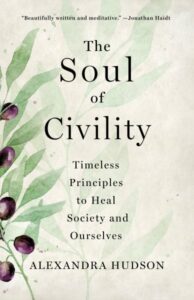 The Soul of Civility: Timeless Principles to Heal Society and Ourselves Alexandra Hudson (St. Martin’s Press) $29.00 OUR SALE PRICE = $23.20
The Soul of Civility: Timeless Principles to Heal Society and Ourselves Alexandra Hudson (St. Martin’s Press) $29.00 OUR SALE PRICE = $23.20
This brand new book is, as Jonathan Haidt says on the front cover, “Beautifully written and meditative.” There are a lot of books on civility these days, some quite lovely, inspiring, hopeful. But few get that kind of accolade from such a serious scholar and respected public intellectual. This is one you should know about.
Here is the fuller quote from Professor Haidt about The Soul of Civility:
As face to face interactions have been replaced by digital interactions, incivility has exploded, with dire consequences for democracies. In this beautifully written and meditative book, Hudson shows us the treasure we are losing in civility, and how to regain it. She reaches back into history and up to a vision of human potential. Along the way, she touches your soul and inspires you to do better. — Jonathan Haidt, author of The Righteous Mind and Thomas Cooley Professor of Ethical Leadership, New York University.
Here is another earnest recommendation from another wise leader, Don Eberly, a long advocate for what used to be called “civil society” which can be enhanced by supporting “mediating structures.” Don Eberly writes:
In The Soul of Civility, Lexi Hudson, one of the most original thought-leaders of her generation, plumbs the depths of American and classical thought on the centrality of a robust civic community in nurturing the habits of pluralistic democracy. This book should be at the top of the reading list for anyone who is eager to reconnect with a vital part of our heritage, and to rediscover a proven path to renewing America’s social institutions. –Don Eberly, author of Restoring the Good Society and America’s Promise
The Soul of Civility was just released and I’ve already stayed up late skimming it, struck by its moving watercolor cover and the author’s opening story about heading to Washington DC and living by rules from her upbringing, mostly about politeness and manners. She said it worked well. Until it didn’t.
You can read how she handled the shock and awe of her early years in DC and her being driven to deeper study and sturdier habits of heart. You should consider her excellent opening bit about the differences between civility and politeness. Her story is pretty great, and it is inspiring to follow along as she studies, thinks, reads, teaches, and talks about civic grace and what is really at the root of our dismaying, dangerous divides. She is a remarkably learned person, having read deeply in ancient books and contemporary issues.
Hudson eventually created a TV series (Storytelling and the Human Condition) for The Great Courses and founded of Civic Renaissance, a publication and an intellectual community dedicated to reviving the wisdom of the past to help us lead richer lives in the present. I wonder if she is working with Braver Angels, a stellar, thoughtful, citizen movement working to restore our frayed republic which has some deep resonance, I think. If you know them you’ll love Alexandra Hudson.
(There is a lovely free offer on the last page, too, inviting you to her content on the Wondrium platform. As she puts it, you’ll enjoy a “globe-spanning, time-jumping, media-traversing tour of the human narrative tradition” that helps us understand who we are and our place in the world. Consider it a thank-you gift for reading and an invitation to be a life-long learner.)
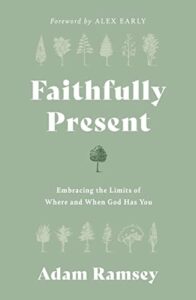 Faithfully Present: Embracing the Limits of Where and When God Has You Adam Ramsey (The Good Book Company) $16.99 OUR SALE PRICE = $13.59
Faithfully Present: Embracing the Limits of Where and When God Has You Adam Ramsey (The Good Book Company) $16.99 OUR SALE PRICE = $13.59
It isn’t every day that a throughly evangelical / gospel-centered book starts off with a Wendell Berry quote, but when I saw Ramsey’s choice epigram about “The Given Life”, I knew he was a wise pastor and most likely a fine writer. So far, I have not been disappointed in this recent release by this hip, Australian pastor. As hip, Seattle pastor Alex Early puts it in his solid forward, making the case that the author lives what he preaches, “Adam has joined the off-key band of those of us who lives our lives upside down, exchanging ambition for faithfulness, being present to where and when we are, rooted in what Jesus describes as abundance (John 10:10).
The first 8 chapters are under the heading of Time. With all the self-help guidebooks to managing our time, not so many reflect on the meaning of our moments. Here, Ramsey ruminates in rich, lovely language about time, the times, seasons, lulls, hurry, pauses, memory, and funerals. The next section of chapters appear under the heading of Place and include reflections on here (“earthly places”), bodies (“human places”), others (“relational spaces”), and eternity (“heavenly places.”) A beautiful epilogue (I jumped ahead, I’ll admit) has the hope-filled title of “Time Unlimited in a Place Uncursed.”)
The writing is peppered nicely with great quotes from fabulous writers; it isn’t every book that cites Lewis Mumford and Anne Lamott, Tish Harrison Warren and (again) Wendell Berry, Alan Noble, Andy Crouch, N.T. Wright and Craig Bartholomew, all alongside the poet Anna Akhmatova.
We are so busy thinking about the next thing, Ramsey warns, that we are “at risk of missing the main thing: the people and places God has put in front of us, right here, right now.” Can we find contentment with our given life? This is a wise, joyful, vital resource to help us find joy in little things and freedom from at least some of the idols of the age.
+++
TO PLACE AN ORDER
PLEASE READ, THEN SCROLL DOWN AND CLICK ON THE “ORDER HERE” LINK BELOW.
It is helpful if you tell us how you want us to ship your orders.And if you are doing a pre-order, tell us if you want us to hold other books until the pre-order comes, or send some now, and others later… we’re eager to serve you in a way that you prefer.
The weight and destination of your package varies but you can use this as a quick, general guide:
There are generally two kinds of US Mail options and, of course, UPS. If necessary, we can do overnight and other expedited methods, too. Just ask.
- United States Postal Service has the option called “Media Mail” which is cheapest but can be a little slower. For one typical book, usually, it’s $4.12; 2 lbs would be $4.87. This is the cheapest method available.
- United States Postal Service has another, quicker option called “Priority Mail” which is $8.50, if it fits in a flat-rate envelope. Many children’s books and some Bibles are oversized so that might take the next size up which is $9.20. “Priority Mail” gets much more attention than does “Media Mail” and is often just a few days to anywhere in the US.
- UPS Ground is reliable but varies by weight and distance and may take longer than USPS. Sometimes they are cheaper that Priority. We’re happy to figure out your options for you once we know what you want.
If you just want to say “cheapest” that is fine. If you are eager and don’t want the slowest method, do say so. It really helps us serve you well so let us know.
BookNotes
SPECIAL
DISCOUNT
20% OFF
ALL BOOKS MENTIONED
+++
order here
this takes you to the secure Hearts & Minds order form page
just tell us what you want to order
inquire here
if you have questions or need more information
just ask us what you want to know
Hearts & Minds 234 East Main Street Dallastown PA 17313
read@heartsandmindsbooks.com
717-246-3333
Sadly, as of October 2023 we are still closed for in-store browsing. COVID is not fully over. Since few are reporting their illnesses anymore, it is tricky to know the reality but the best measurement is to check the waste water tables to see the amount of virus in the eco-system. It is bad and now getting worse. It’s important to be aware of how risks we take might effect the public good — those at risk, while not dying from the virus, are experiencing long-term health consequences. (Just check the latest reports of the rise of heart attacks and diabetes among younger adults, caused by Covid.) It is complicated, but we are still closed for in-store browsing due to our commitment to public health (and the safety of our family who live here, our staff, and customers.) Our store is a bit cramped without top-notch ventilation, so we are trying to be wise. Thanks for understanding.
We will keep you posted about our future plans… we are eager to reopen.
We are doing our curb-side and back yard customer service and can show any number of items to you if you call us from our back parking lot. It’s sort of fun, actually. We are eager to serve and grateful for your patience as we all work to mitigate the pandemic. We are very happy to help, so if you are in the area, do stop by. We love to see friends and customers.
We are happy to ship books anywhere.
We are here 10:00 – 6:00 EST / Monday – Saturday. Closed on Sunday.

